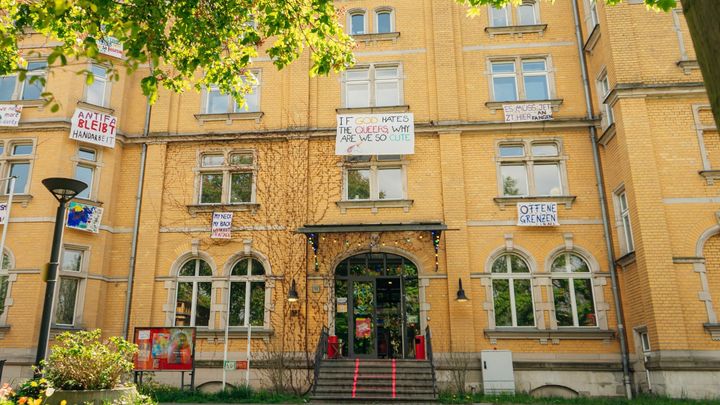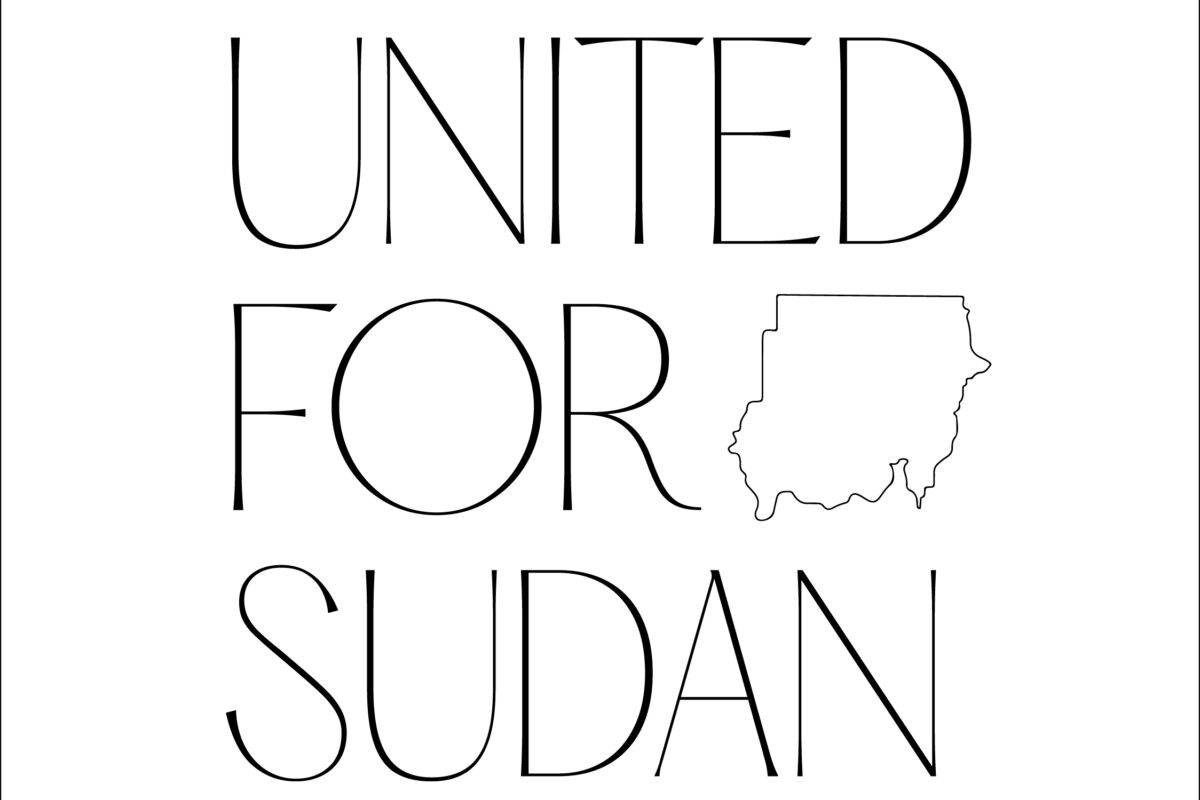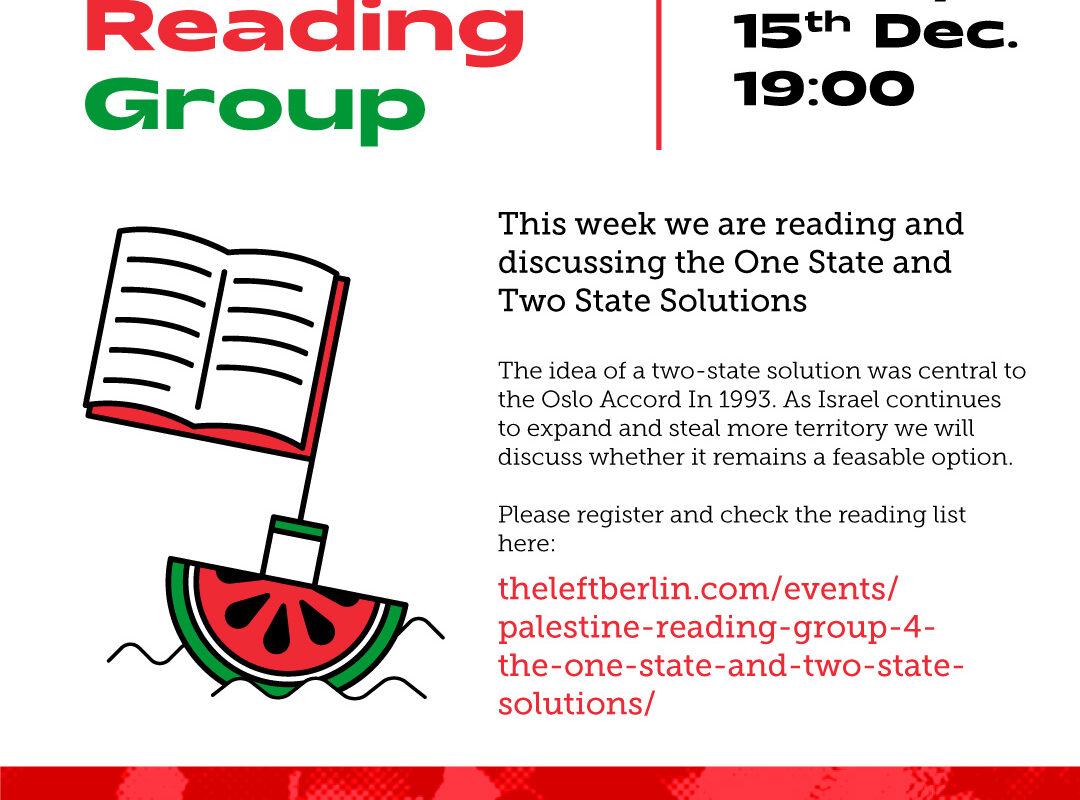It all started with a social media post. It was 7th November, exactly one month after the Hamas attack in Southern Israel. Israel’s response had been murderous, with targeted bombings of hospitals, schools and residential areas. After an initial ban of all demonstrations against this terror, Berlin had started to see some sizeable ones – sizeable by German standards at least, but we’ll come to that.
This is the context in which Hanna, one of the speakers of the Berlin LINKE Internationals made the following post in theleftberlin internal Telegram channel:
Hi all, someone wrote me about whether there are any reading groups about Palestine, saying that a lot of people now going to the protests are not very well informed on the history and are learning things on the go and often from Instagram posts (which can be great but have their limits).
Does anyone know of something like this that already exists? Or does anyone have the energy to start a reading group through theleftberlin? I think we could be very well placed to lead something like this. I would be happy to be involved but wouldn’t have capacity to do it all by myself.
Hanna’s post reflected what a lot of us were already thinking. And if someone has a good idea, but no-one’s doing anything yet, why not do it ourselves? Someone agreed to assemble a set of texts to discuss. We contacted Café Karanfil, an anti-imperialist bar in Berlin-Neukölln and asked if we could use their cellar. There’s only room in the cellar for 10-15 people, but that didn’t seem to be a problem. We were organising everything quickly and at short notice.
Within 24 hours of us announcing the event, 40 people had registered. We immediately closed down registrations and booked a second meeting in Karanfil to discuss the same texts. To people who had not registered yet, we said that things had obviously taken on much bigger dimensions than we were expecting, and that we would organise a regular event in a bigger venue starting the following week.
Why were so many people interested?
At the beginning of each session, we ask everyone to introduce themselves and explain why they’re there. The original aim of the Reading Groups was to build up our knowledge, and to strengthen our ability to argue for Palestinian rights. This certainly has been one function of the groups, but it became quickly evident that many people were coming for a different reason.
During the introductions, person after person said: “I’m watching the devastation of Gaza, but when I raise this with my German friends they don’t want to talk about it, or – even worse – they try to justify it. I feel that I can’t talk about Gaza without jeopardising good friendships”. The Reading Group provided a safe space for a discussion that many people needed to have, but could not find anywhere else to have it.
Some people in the group – a minority – were Germans. They reported growing up in an educational system which worshipped at the altar of German Staatsräson (a phrase which has become more familiar to many people in the last few months). As survivors of this system, many of them still found it difficult to criticise Israel, even while they were witnessing the horrific bombing of civilians. But they too needed a space where they could talk.
All this meant that the level of debate was much higher than I was anticipating. Many of the people who were attending had clearly thought long and hard about the issue. The clarity and articulacy of their arguments helped raise all boats. Even people who had been affected by the lack of debate in Germany made engaged and informed contributions and questions from which we all profited.
Moving on up
After this initial dry run, the first official Reading Group was held on Friday, 21st November. Nearly 40 people discussed “What is Zionism?” The discussion mainly focussed on the foundation of the State of Israel and the Palestinian Nakba, although many people raised the question of how we could have similar discussions with a white German audience.
To ensure that everyone had a chance to speak, we broke up into small groups of 10-15 people, and then came back together to share what we’d learned. One mistake that we made was not to arrange anywhere to go after the meeting, as after the two hour Reading Group, people had the need to carry on talking.
The first couple of Reading Groups were held in the Projektraum auf H48, a collective housing project in Neukölln, to whom we are eternally grateful. The H48 collective represents the full range of opinions on the German Left, which means that not everyone was overjoyed about hosting a discussion on Palestine. Nonetheless, we never received anything less than support. H48 is currently making a legal challenge against gentrifiers who are trying to take over a necessary space in Berlin. We urge you to support their campaign.
The second reading group focussed on Palestinian Resistance, and in particular on Hamas. It was a discussion unlike any I’d ever had in Germany. Here, Hamas is the Todschlagargument (knockout argument). If ever you try to raise Palestinian rights, all someone who disagrees has to do is ask “but what about Hamas?”, usually resulting in any discussion being closed down.
In the reading group, however, no-one challenged the idea that Hamas’s violent reaction to decades of oppression and subjugation was legitimate. The discussion focussed more on two issues – is the Hamas strategy effective, and what mistakes did the Palestinian Left make, which led to Hamas being able to lead this resistance? As ever, we heard many different and nuanced points of view, and everyone was given a fair hearing.
By 8th December, we’d moved once more, to the AGIT offices in Nansenstraße 2. AGIT is a British left-wing organisation which made room booking less complicated. For the third week running, over 30 people turned up to discuss German Memory Culture and the specific problems encountered by Internationals who try to raise the issue of Palestine in Germany.
Onwards and upwards
The next Reading Group is planned for Friday, 15th December, when we will be discussing the One State and Two State Solutions, once more in Nansenstraße 2. You can register and see the recommended reading here. After that, we will be taking a break over the holiday period, then resume in January with a discussion about the role of the Arab States surrounding Palestine.
Over the break, we will take the opportunity of organising two surveys – one to find the day(s) which best suit everyone, and another to decide the topics for future Reading Groups. We are also looking for people who can collect suggested reading about a particular subject. One of the successes of the group is that we organise collectively, with everyone making the contributions that they can.
The Reading Group has also sparked off a number of other initiatives. We now run an occasional Palestine film evening, part of which includes food and a fundraiser for Palestinian causes. We have produced stickers, which anyone can pick up on Friday. In January, we’ll be organising a public meeting on Apartheid Israel with South African academic and anti-apartheid activist Patrick Bond and Palestinian lawyer Nadija Samour.
We have also set up a parallel group to increase public support for Palestine solidarity in Berlin. This group had its first meeting just before the last Reading Group and is planning a discussion of narratives, the development of our skills and confidence, and reaching out to possible allies. The aim is a staged intervention in German civil society aimed and shifting the balance of what we (are allowed to) discuss regarding Palestinian rights and to build support for Palestinian liberation.
If you are interested in any aspect of this, the first step is to come along on Friday. We also carry out a lot of preparatory work in the Reading Group section of theleftberlin Telegram channel. You can join the channel here. If this sounds like too much, but you want to be informed about coming events, everything will be announced in the weekly Newsletter of theleftberlin to which you can subscribe here.
What have we learned?
The Palestine Reading Groups were never intended to be an alternative to the demonstrations – more a supplement. Indeed, we try to link the two. At the end of each meeting, we tell people about the next demo, and try to set up a meeting place where we can meet up and march together. In this way, we try to bring together theory and practise at a time when both are sorely needed, particularly in Germany.
The most important function of the Groups has been to break the isolation of Palestine activism in Germany. Many people – both Germans and non-Germans – feel instinctive support for the Palestinians, but also that they are on their own, which makes it difficult to implement effective change. The Reading Groups are not just about education. They also help to bring us together and feel the strength of our collective solidarity.
We have committed ourselves to continue organising Reading Groups for as long as people want to attend. We rather expected that after the first 1 or 2 meetings, attendance would tail off. This has not happened so far. Instead, we seem to have chanced upon fulfilling a need deeply felt by people who are appalled by the devastating bombardment of Gaza. We will continue to do this, both in the articles we publish on theleftberlin and in the Events we offer.
We have also now adopted an informal policy of “bring a white German”. This is in part a joke, but also a statement of intent. We want to break out of our international bubble where opposing the State murder of thousands of children is not controversial. We want to see demonstrations in Germany which are as big as the ones we see in London and New York. And we can’t do that if only Internationals are demonstrating.
If you are interested in setting up your own reading group, or would just like to read more about different aspects of the israel/Palestine conflict, we have just set up a page of all the readings which we have suggested for Reading Groups so far. As more Events take place, we will continue to update this list. If you have any questions about what we are doing and what we have learned, feel free to contact us on team@theleftberlin.com.



